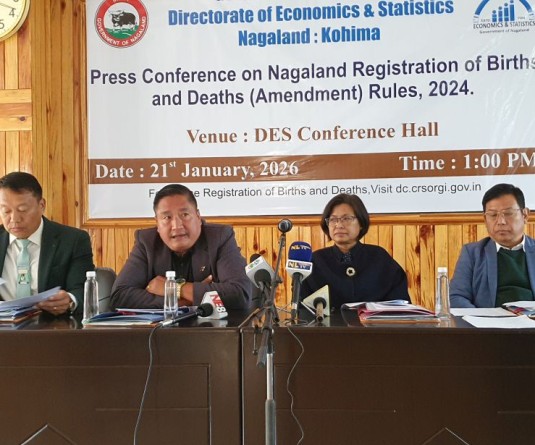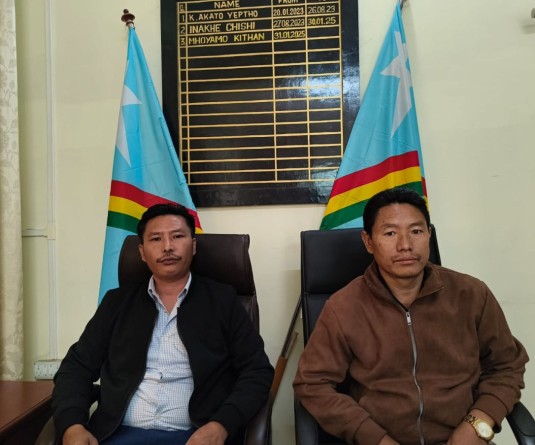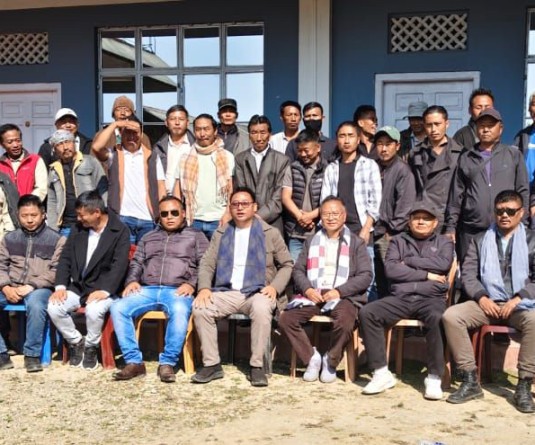Küdecho Khamo and others with sanitation workers after distributing PPE kits and Ayushman Health Card in Kohima on March 13. (Morung Photo)
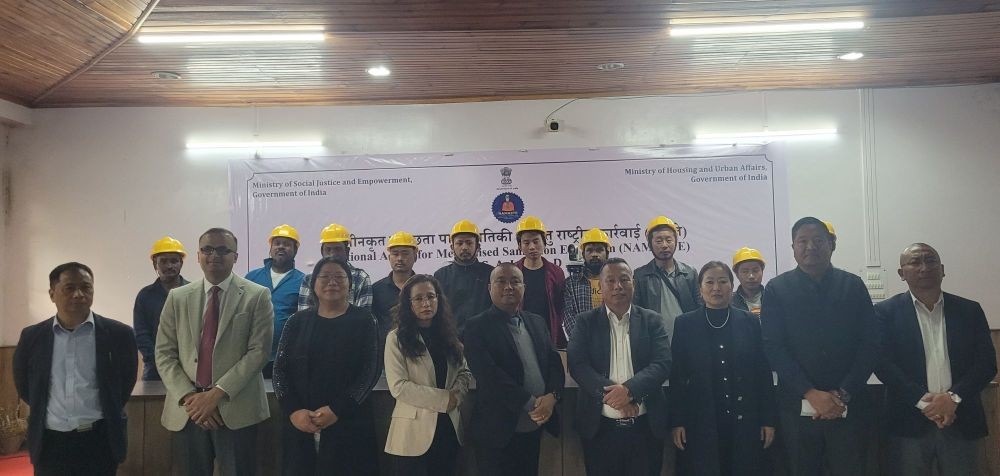
Sanitation workers get PPE kits, Ayushman Health Card
Our Correspondent
Kohima | March 13
Nagaland today recognized the contribution of sanitation workers during the launching programme of PM- SURAJ National Portal (Pradhan Mantri Samajik Utthan evam Rozgar Adharit Jankalyan) by Prime Minister Narendra Modi in 510 districts in the country.
Joining the launching programme with the rest of the country at Deputy Commissioner’s Conference Hall, Kohima, Nagaland CAWD & Taxes Advisor Küdecho Khamo distributed PPE kits and Ayushman Health Card to the sanitation workers from Kohima and Dimapur.
On behalf of the state government, Khamo lauded the sanitation worker or safai karamcharis for sacrificing and risking their lives to keep the city and towns clean.
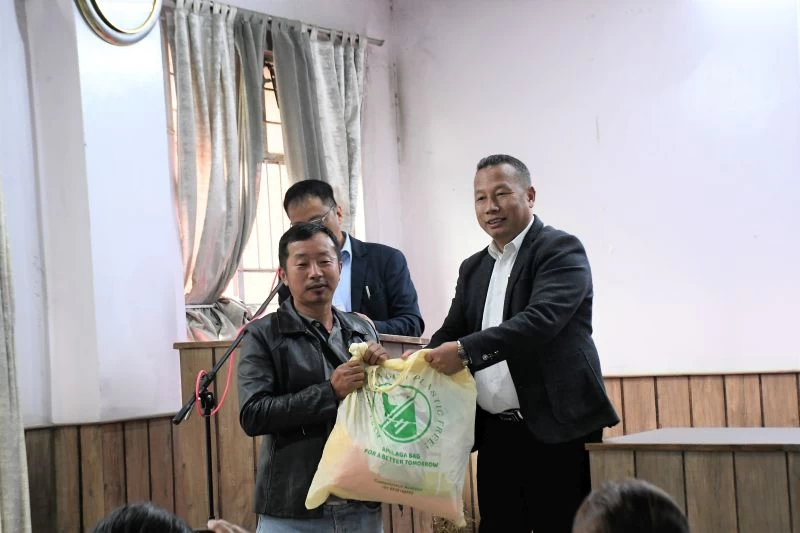
“As we have seen in the recent years, the central as well as the state government are trying to reach out to the last man and to the poorest man in this country,” he said.
Khamo asserted that no nation can progress until and unless the last person or the poorest person is taken care.
Today, he said, various departments are taking initiatives to reach out to the people in both urban and rural areas.
He stressed on the need to ensure the schemes reach the targeted people.
Further, Khamo also urged upon the beneficiaries to ensure timely repayment of the loans and also, to sincerely utilise the money.
MLA C Manpon Konyak hailed the launch of the PM-SURAJ National Portal as a significant milestone for marginalized communities.
He stressed the importance of transparency within the implementing agency to ensure the resolution of disparities between different societal strata.
Kohima Deputy Commissioner Kumar Ramnikant called upon the sanitation workers to come forward for any clarification or help.
‘Strive towards working for the welfare sanitation workers’
Nagaland Social Welfare Secretary Martha R Ritse informed that the Ministry of Social Justice and Empowerment, Govt. of India organised PM-SURAJ Outreach Programme with beneficiaries from socially disadvantaged sections of society receiving credit support.
The target group includes Scheduled Castes, safai karamcharis and Backward Classes.
At the state level, the Department of Social Welfare is designated as the nodal department for matters related to safai karamchari/sanitary and insanitary workers.
“In this on-going National programme, concessional loans to one lakh beneficiaries are proposed to be disbursed through the three corporations, namely National Backward Classes Finance and Development Corporation (NBCFDC), National Scheduled Castes Finance and Development Corporation (NSFDC), National Safai Karamcharis Finance & Development Corporation (NSKFDC),” she said.
She said that Nagaland joins the rest of the country to be part of today’s event which aims to cover 510 districts across states and UTs.
At the state level, Department of Social Welfare, Department of Urban Development, along with District administration are involved in organizing this event.
There is also a new scheme being formulated by the Ministry of Social Justice and Empowerment, GoI with the objective to ensure safety and dignity of sanitation workers, i.e., National Action for Mechanised Sanitation Ecosystem (NAMASTE): It is envisaged to be implemented in collaboration with key stakeholders and line departments including Social Welfare, Urban Development, Deputy Commissioners. etc.
At present, there are 39 ULBs in Nagaland and over 500 safai karamcharis (Sanitation Workers) in the state.
“Through this scheme and other programs of the central government, I hope that the stakeholders involved, continue to strive towards working for the welfare of the marginalized sections of the society and particularly to ensure better working system for sanitation workers,” she added.
‘NAMASTE is to ensure safety, dignity of sanitation workers’
Elizabeth Ngully, Additional Secretary and State Nodal Officer NAMASTE, Urban Development Department Nagaland said that Safai karamcharis or sanitation workers are the foundation and heart of our nation’s and state's sanitation.
“Without them, the dream of clean India or Nagaland cannot be achieved,” Ngully said.
Even prior to any mission or scheme, our safai karamcharis have been tirelessly and quietly carrying on the mammoth task of keeping our city clean, she said.
Amongst these safai karamcharis as well, there exist a lower stratum that does the menial of all sanitation work manual scavenging, those that clean, handle and dispose human fecal waste manually from dry latrines, open drains and sewers.
This practice has been banned in 1993 but it is still prevalent. The 1993 Act was replaced by the "Prohibition of Employment as Manual Scavengers and their Rehabilitation Act, 2013" (MS Act, 2013) with the aim of reinforcing the ban and urgent need to rehabilitate the manual scavengers.
Since then, benefits like subsidized loans to sanitation workers for procurement of sanitation-related projects, training support for skill building, workshops on hazardous cleaning of sewers and septic tanks, etc., are being provided under SRMS (Self-Employment Scheme Rehabilitation of Manual Scavengers).
She said that despite these interventions, the practice still exists in modem India. As per National Commission Safai Karamcharis (NCSK), 1056 sewer and septic tank-related deaths have taken place between 1993 and 2023 from 24 States and Union Territories.
Realizing the need for an external, dedicated and sensitive support structure, from the national level to the city level, to inculcate safe occupational practices, strengthen the operationalization of Sanitation Response Units and promote skilling and entrepreneurship, the Ministry of Social Justice and Empowerment (MoSJE) and Ministry of Housing & Urban Affairs (MoHUA), formulated the National Action for Mechanized Sanitation Ecosystem (NAMASTE) scheme to make sanitation work safer across urban India in a time-bound mission mode, she said.
NAMASTE is a convergent effort amongst different ministries to ensure the safety and dignity of sanitation workers.
Since last year, the first step of NAMASTF has been implemented. that is identifying the SSWs be it employed by ULBs, private agencies or individual undertaking, through profiling camps conducted across different states, In Nagaland, the profiling of SSWs in the ULBs started on 16th February 2024 and ended on 2nd March, 2024.
Out of the 39 ULBs, 66 SSWs have been identified from 22 ULBs.
17 UBLBs have declared that there are no SSWs in their jurisdiction. The profiling is a continuous process and SSWs will be identified as and when it comes to the knowledge of the UBLBs or the office, Ngully said.
NAMASTF has been approved four years from 2022 till 31st March, 2026. National Safai Karamcharis Finance & Development Corporation Limited is the implementing agency for the Scheme.
Earlier, the programme was chaired by Imlitonzuk Ao, District Welfare Officer Kohima while welcome address was delivered by T Lanusenla Longkumer, Administrator Kohima Municipal Council.


